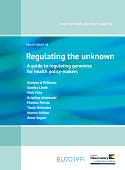Regulating the unknown: a guide to regulating genomics for health policy-makers (2021)

Download
This brief’s key messages are:
- Genomics can improve individual and population health outcomes, but making genomic data widely available creates ethical, legal and social challenges.
- Genomics reveals sensitive personal and familial information. This may improve prevention and treatment but means that, without regulation and other measures, at risk individuals can be discriminated against; or that those at low risk may opt out of public protection. This endangers the equity and solidarity that underpin European health systems.
- The possibility of data being misused by insurers, employers or others makes it essential that there is strong regulation of genomic data in research, in health care and more widely. Regulation needs to be proportionate to balance privacy and data security against the benefits of scientific advances and their translation into clinical practice.
- The 2018 European Union General Data Protection Regulation (GDPR) has transformed the way genomic data are processed and will impact research, clinical practice and national regulators, even beyond the EU.
- The benefits of genomics can only be realized if, in addition to effective regulation:
- There is broad societal trust built by active dialogue and engagement.
- All stakeholders, including industry are involved so that genomic initiatives engender confidence and align with societal values.
- Wider information infrastructure and digitalization strategies are in place so that genomic data can be linked to other information without breaching public trust.
- Policy makers are able to manage the costs of genomics-driven innovation and ensure that benefits give value for money, improve health and are fairly distributed.





















